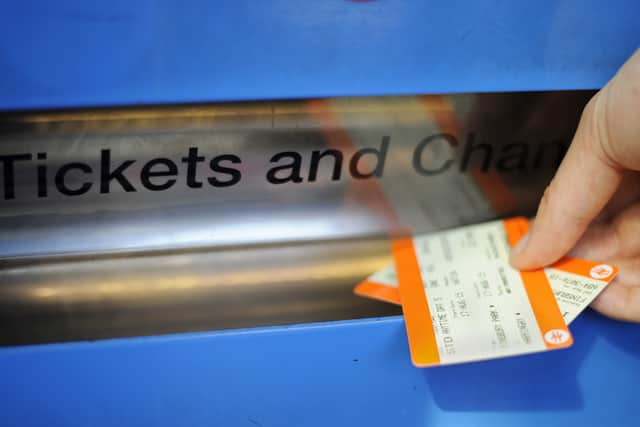Rail fares in England could rise by 8% next year, new figures show
and live on Freeview channel 276
Train users in England could see an increase of up to 8% for their rail fares next year if the Government uses the same formula as this year, new figures show. Analysis of industry data by the PA news agency shows this would be the highest annual increase since at least 1996, when Britain’s railways were privatised.
The Department for Transport (DfT) aligned this year’s cap on fare increases with Britain’s average earnings growth for July 2022, which was 5.9%. Figures published by the Office for National Statistics on Tuesday show the same measure for July 2023 was 8%.
Advertisement
Hide AdAdvertisement
Hide AdThe DfT has previously confirmed that next year’s fare rises will be below the Retail Prices Index (RPI) measure of inflation for July – which was 9% – but has not announced what formula it will use.
Examples of the impact of an 8% increase include annual season tickets from Woking to London rising by £310 to £4,190, while an off-peak return from Manchester to London would cost £112.20 following an £8.30 hike.
Norman Baker, director of external affairs at pressure group Campaign for Better Transport and former Liberal Democrat transport minister, said: “The Government has yet to confirm next year’s rail increase, but if it follows the same formula as last year and uses today’s average earnings growth rate, passengers will face eye-watering increases.
“Rather than hammer rail passengers yet again, the Government should freeze rail fares – as they have done with fuel duty – until the long-promised ticketing reform takes place.”
Advertisement
Hide AdAdvertisement
Hide AdA DfT spokeswoman said: “Following last year’s biggest ever Government intervention to cap rail fare increases well below inflation, we’ll continue to protect passengers from cost-of-living pressures and we will not increase next year’s rail fares by as much as the July RPI figure.
“Any increase will also be delayed until March 2024, temporarily freezing fares for passengers to travel at a lower price for the entirety of January and February as the Government continues with its plan to halve inflation.”


The earnings growth figure used to determine the cap on fare rises in 2023 was the percentage change in average total pay in July 2022 compared with a year earlier.
About 45% of fares on Britain’s railways are regulated by the Westminster, Scottish and Welsh Governments.
Advertisement
Hide AdAdvertisement
Hide AdThey include season tickets on most commuter journeys, some off-peak return tickets on long-distance routes, and flexible tickets for travel around major cities.
Train operators set rises in unregulated fares, although these are likely to be very close to changes in regulated ticket prices as their decisions are heavily influenced by governments due to contracts introduced because of the coronavirus pandemic.
The Scottish and Welsh governments have not announced their rail fare plans for 2024. Fares in Northern Ireland are set by operator Translink.
Comment Guidelines
National World encourages reader discussion on our stories. User feedback, insights and back-and-forth exchanges add a rich layer of context to reporting. Please review our Community Guidelines before commenting.
